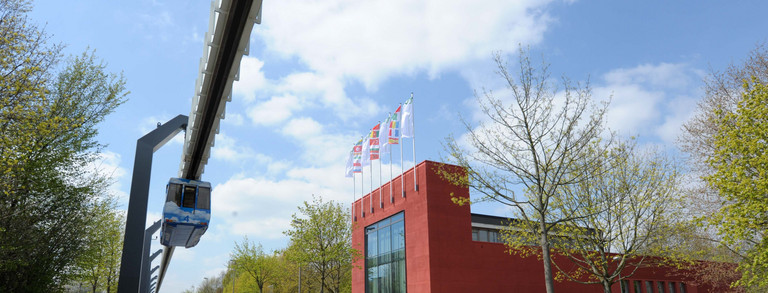Guideline for the Conclusion of Bilateral Agreements
There are different types of international partnership agreements. In general, partnerships with international universities can be categorized as follows: University-wide Agreements, Department-wide Agreements Student Exchange Agreements Erasmus+ Inter-Institutional Agreements.
Learn more about the processes to be followed when concluding bilateral agreements at TU Dortmund University and what support you will receive.
Bilateral Agreements - an Overview
The conclusion of an agreement on university level is usually based on previous contacts of researchers of several departments and/or institutes with the corresponding international cooperation partner. Cross-department agreements can also be concluded for strategic reasons.
Which criteria should be met for a cooperation on university level?
- suitable partners are internationally recognized foreign institutions;
- the cooperation must be feasible for a duration of at least five years;
- the funding must be secured at least for a medium term;
- the cooperation must be implemented between at least two departments or institutes of the university, both in research and teaching;
- there is a planned and subject-specific exchange of knowledge, research, lecturers/university teachers and students.
Which further aspects should be considered in regard to the choice of cooperation partners?
When choosing cooperation partners, due to limited resources it is recommended to consider whether the targeted university adds to the further development of the subject-specific profile of TU Dortmund University. It is also advisable to focus on partners with considerable strategic importance.
Which procedural steps need to be taken to conclude an agreement on university level?
While the procedure itself is guided by the International Office, the Rectorate is responsible for the implementation of the cooperation agreement in close collaboration with the corresponding departments. The International Office also coordinates the reporting to the governing bodies of the university.
Does the signing of the cooperation agreement involve a financial subsidy?
No financial support is involved in the successful conclusion of the agreement.
After legal assessment of the draft agreement, the International Office presents the proposal to the Rector. If he agrees with the draft agreement, the International Office receives the signed agreement. After the partner institution has signed the agreement, the original agreement must be sent back to the International Office.
You are welcome to use the draft agreement of TU Dortmund University.
Learn more about the global network of TU Dortmund University in an overview of the international partnerships.
Concluding an international partnership agreement on department level is the recommended option for the sole cooperation of one department with a department or an institute of the international partner institution.
Which criteria should be met for a partnership on department or institute level?
- suitable partners are internationally recognized foreign institutions;
- the cooperation must be feasible for a duration of at least five years;
- the funding must be secured at least for a medium term;
- there is a planned and subject-specific exchange of knowledge, research, lecturers/university teachers and students;
- a contact person needs to be appointed in the corresponding department who coordinates the content of the cooperation agreement (e.g. selection procedures for the outgoings, accommodation and support for the incomings).
Funding
No financial support is involved in the successful conclusion of the agreement.
Which procedural steps need to be taken to conclude an agreement on department/institute level?
While the procedure itself is guided by the International Office, the Rectorate is responsible for the implementation of the cooperation agreement in close collaboration with the corresponding department or institute.
The following documents need to be submitted to the International Office via e-mail:
- a draft agreement, based on the provided agreement template and drafted together with the cooperation partner
- a short report with an elaboration of the already implemented and planned activities, together with the contact persons for the coordination of the cooperation (complete contact details including e-mail address)
- an approval of the cooperation agreement by the corresponding dean (submission in form of an e-mail is sufficient)
After legal assessment of the agreement, the International Office presents the proposal to the Vice President International Affairs. If she agrees with the draft agreement, the International Office receives the signed agreement. After the partner institution has signed the agreement, the original agreement must be sent back to the International Office.
You are welcome to use the draft agreement of TU Dortmund University.
Learn more about the global network of TU Dortmund University in an overview of the international partnerships.
Student Exchange Agreements
Concluding a student exchange agreement on department level is the recommended option if a department aims to cooperate with a department or an institute of the international partner institution but wants to focus exclusively on the exchange of students.
Which criteria should be met for a partnership on department or institute level?
- suitable partners are internationally recognized foreign institutions;
- the cooperation must be feasible for a duration of at least five years;
- the funding must be secured at least for a medium term;
- a contact person needs to be appointed in the corresponding department who coordinates the content of the cooperation agreement (e.g. selection procedures for the outgoings, accommodation and support for the incomings).
Funding
No financial support is involved in the successful conclusion of the agreement.
Which procedural steps need to be taken to conclude a student exchange agreement on department/institute level?
While the procedure itself is guided by the International Office, the Rectorate is responsible for the implementation of the cooperation agreement in close collaboration with the corresponding department or institute.
The following documents need to be submitted to the International Office via e-mail:
- a draft agreement, based on the provided agreement template and drafted together with the cooperation partner
- a short report with an elaboration of the already implemented and planned activities, together with the contact persons for the coordination of the cooperation in both institutions (complete contact details including e-mail address)
- an approval of the cooperation agreement by the corresponding dean (submission in form of an e-mail is sufficient)
After legal assessment of the draft agreement, the International Office presents the proposal to the Vice President International Affairs. If she agrees with the agreement, the International Office receives the signed agreement. After the partner institution has signed the agreement, the original agreement must be sent back to the International Office.
You are welcome to use the draft agreement of TU Dortmund University.
Learn more about the global network of TU Dortmund University in an overview of the international partnerships.
In order for mobility of students and teaching staff between two or more universities within the framework of the European education program Erasmus+, a digital Erasmus+ Inter-Institutional Agreement (IIA) must be concluded between the sending and the receiving university for the duration of the contract.
The IIA thus regulates the exchange with eligible universities in the 33 so-called program countries in KA131.
What criteria must be met to conclude an Erasmus+ Inter-Institutional Agreement?
- the Erasmus+ departmental coordinator selects suitable partners,
- the potential partner university must be in possession of a valid Erasmus Charter for Higher Education (ECHE),
- the Erasmus+ departmental coordinator has clarified the content with the partner university (e.g. language level, scope of the student and/or teaching staff exchange)
What other aspects should be considered when selecting cooperation partners?
When choosing a cooperation partner, it is advisable to ensure that the course content at the partner university is as similar as possible to that of TU Dortmund University, so that recognition of the coursework completed abroad can take place without any problems for the students. Furthermore, it is advisable to choose the partner universities in such a way that an active exchange in both directions can be expected.
What procedural steps are necessary to conclude an Erasmus+ Inter-Institutional Agreement?
Each department has at least one Erasmus+ departmental coordinator who is responsible for the exchange within the department. He/she contacts Hella Koschinski, International Office, directly to start the process of the digital IIA.
All Inter-Institutional Agreements are signed centrally by the Erasmus+ Institutional Coordinator Silke Viol (International Office). This is done digitally via the corresponding IT system and sent digitally to the partner university.
The Inter-Institutional Agreements must be concluded before the start of an academic year and should cover several academic years (however, the maximum end date is determined by the respective program duration of the EU - currently the academic year 2028/2029).
General information about the Erasmus+ program can be found on the Erasmus+ page.
An overview of all existing IIAs (student mobility) is linked to the database under Erasmus+ Partner Universities and is therefore updated on a daily basis. If you like to find out about the current IIAs in the area of Erasmus+ teaching staff mobility, you can do so under "Which Universities Do the Departments Cooperate with?".
Further interesting topics are available in the ServicePortal
- Please feel free to use the Style Guide for English language use for common translations of terms from the academic context and specific expressions used at TU Dortmund University.
- List your existing international reserarch contacts, or identify countries where you would like to set up a research collaboration.
Contact
For inquiries about cooperations with Asia and Central and South America, please contact Mrs. Artmann.
For inquiries about cooperations with North America, Europe, Africa and Oceania, please contact Mrs. Schubert.
Contact for general inquiries: cooperation@tu-dortmund.de











